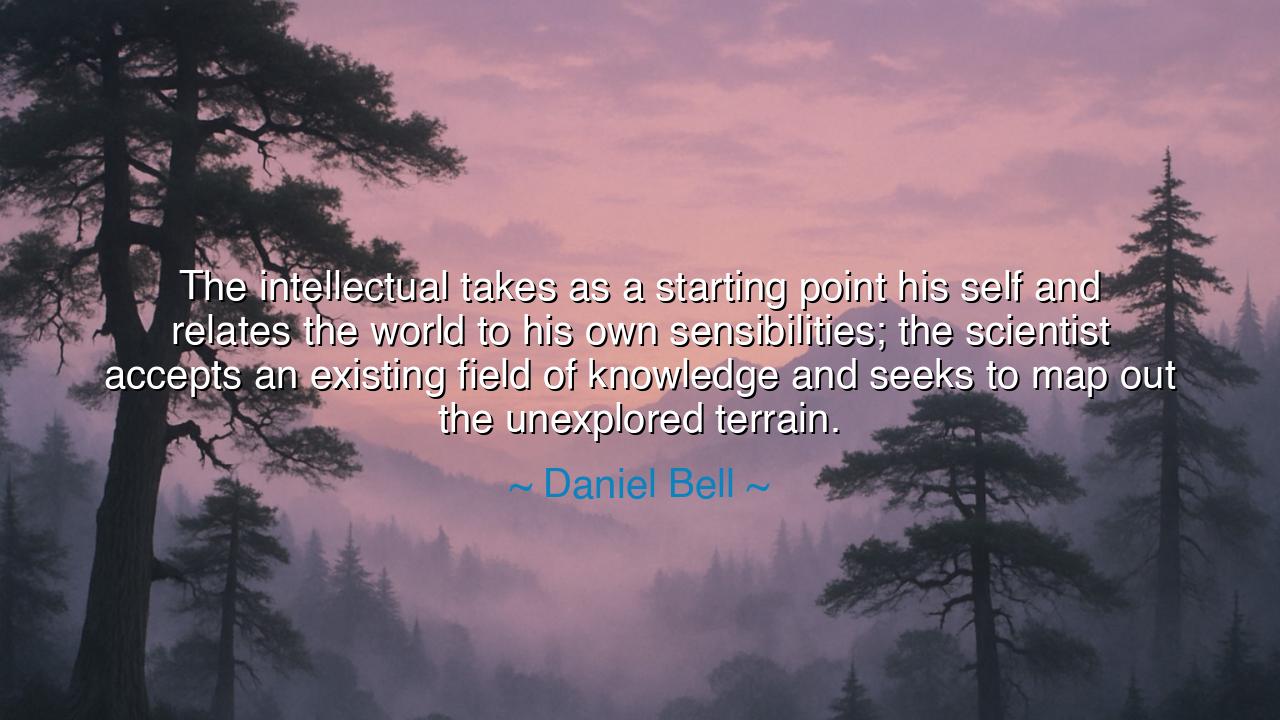
The intellectual takes as a starting point his self and relates
The intellectual takes as a starting point his self and relates the world to his own sensibilities; the scientist accepts an existing field of knowledge and seeks to map out the unexplored terrain.






The sociologist and thinker Daniel Bell once wrote: “The intellectual takes as a starting point his self and relates the world to his own sensibilities; the scientist accepts an existing field of knowledge and seeks to map out the unexplored terrain.” In this saying he reveals the twin paths of human understanding, paths that have carried civilization forward in different but complementary ways. One begins in the heart of man—the intellectual, who looks inward, who interprets, who weaves meaning from the fabric of his own consciousness. The other begins outside the self—the scientist, who accepts what is already known and pushes the boundaries into what is yet undiscovered.
The intellectual, in Bell’s view, is like the poet or the philosopher. His work begins not with instruments or data, but with reflection, with doubt, with vision. He relates the world to his own sensibilities, judging it through the prism of his own mind and spirit. When Socrates questioned the Athenians, he did not measure stars or dissect plants; he measured the soul, asking what justice, virtue, and truth truly meant. He began with the self, with the restless inner voice, and from there sought to interpret the whole world.
By contrast, the scientist accepts the accumulated knowledge of his field as the bedrock upon which to build. He does not begin with self, but with the shared tradition of science: the laws already tested, the theories already proven, the methods already sanctified by use. His greatness lies not in interpreting the world according to his own sensibilities, but in venturing into the unknown—into the “unexplored terrain.” Thus, Galileo looked through his telescope not to express himself, but to expand the map of the heavens, confirming what was suspected and revealing what had been hidden.
Bell’s wisdom lies in showing that both figures are essential. The intellectual awakens the conscience of society, challenging assumptions, questioning values, and offering vision. The scientist expands the horizons of practical knowledge, uncovering truths about matter, life, and the cosmos. Without the intellectual, we may lose our sense of purpose; without the scientist, we may stagnate in ignorance. Together, they form the wings by which humanity rises: one wing of meaning, the other of discovery.
History provides examples of men who walked both paths. Leonardo da Vinci was both intellectual and scientist: he painted the mysteries of human expression while dissecting the anatomy of the human body; he dreamed in metaphors and designed machines with precision. His self was a starting point, but he also accepted the fields of mathematics and engineering, pushing their limits. In him, Bell’s distinction becomes harmony—the vision of the intellectual fused with the exploration of the scientist.
The meaning of Bell’s words for us is profound: we must not confuse the roles, nor exalt one while despising the other. To demand of the intellectual the rigid proofs of science is folly, for his task is to stir the heart and awaken reflection. To demand of the scientist the visionary eloquence of the poet is unjust, for his task is to chart reality, not to adorn it. Yet each can learn from the other, and together they bring balance to the restless human spirit.
The lesson for us, O seeker of wisdom, is to honor both paths. Cultivate within yourself the questioning spirit of the intellectual: reflect on your life, your values, and your place in the world. But also cultivate the discipline of the scientist: respect knowledge, learn from what has been discovered, and push the frontier of what can be known. Do not let your vision float unanchored, nor your exploration become soulless. Unite self with knowledge, meaning with method, reflection with discovery.
Thus, let Daniel Bell’s words echo through time: the intellectual begins with self, the scientist with knowledge; one interprets, the other explores. Both are necessary, both are noble, and both together illuminate the path of humanity as it journeys ever forward, seeking truth not only in the stars above but in the soul within.






AAdministratorAdministrator
Welcome, honored guests. Please leave a comment, we will respond soon